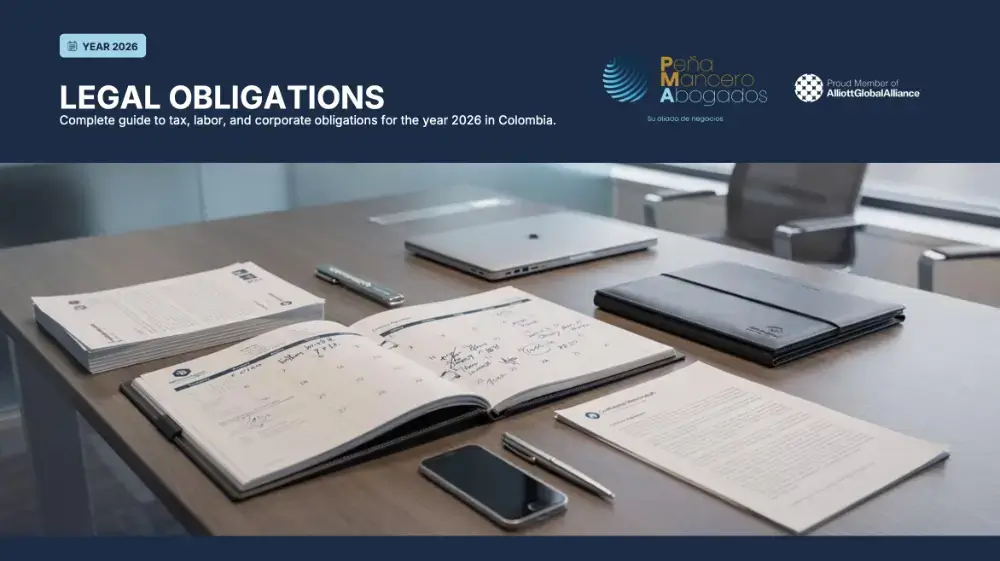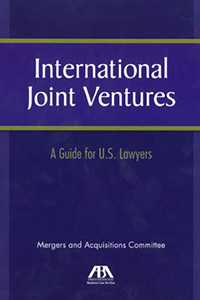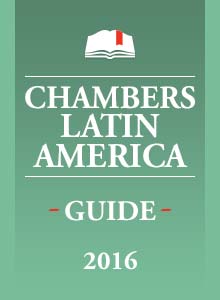Obligation to enter data in the Beneficial Ownership Single Registry “RUB”

By: Juan Simon Larrea & Javier Moya
With the issuance of Law 2155 of September 14, 2021 “Social Investment Law”, articles 631-5 and 631-6 of the Tax Statute (hereinafter “ET”) were modified and the Single Registry of Final Beneficiaries (hereinafter “RUB”) was created, which was regulated by Resolution 164 of December 2021, subsequently modified by Resolution 37 of March 17, 2022, issued by the National Tax and Customs Directorate “DIAN”. In addition, the Identification System for Structures Without Legal Personality “SIESPJ” was created.
Acronyms and Abbreviations
- SWLP – Structure Without Legal Personality
- RUB – Single Registry of Beneficiary Owners
- RUT – Single Tax Register
- SIESPJ – Identification System for Structures Without Legal Personality
- BO – Beneficiary Owner / Final Beneficiary
- DIAN – Directorate of National Taxes and Customs
1. Single Register of Beneficial Owners “RUB”
1.1. What is RUB?
The RUB is the registry that is an integral part of the Single Tax Registry (RUT) that must be completed virtually and in which legal entities and unincorporated or similar structures must provide the information of their Beneficiary Owners.
1.2. Who are the Beneficiary Owners of legal persons?
The BO of Colombian legal entities, according to article 631-5 of the ET, is any individual who:
- Acting individually or jointly, holds, directly or indirectly (through third parties), five percent (5%), or more of the capital or voting rights of the legal person, and/or benefits in five percent (5%), or more of the assets, yields or profits of the legal person.
In order to better understand the above condition, by way of example we can establish that any individual who is a shareholder of any type of corporation with a percentage greater than 5% is a Final Beneficiary. Likewise, if he/she is a shareholder in this proportion, but indirectly (through a legal entity), he/she would also be considered as a Final Beneficiary.

- Acting individually or jointly exercises direct and/or indirect controls[1] over the legal entity by any means other than those set forth in the preceding point.
Regarding this second condition, the Inter-American Development Bank’s Manual on Beneficial Ownership establishes that the individual may exercise direct or indirect control through a significant percentage of the voting rights, or the ability to appoint or remove members of the board of directors of an entity.
It can also be exercised in other ways. For example, through a power of influence or veto over the decisions made by an entity, through agreements between shareholders or partners through family or other ties with decision makers, or through the ownership of negotiable obligations or other debt securities of an entity convertible into shares.
Thus, according to the manual and the recommendations issued by the Financial Action Task Force (FATF), the beneficial owner must be identified through other means such as exercising control without having an ownership interest in a company.
Now, as a residual condition and only when no beneficial owner is identified (in non-corporate legal persons such as: national or foreign non-profit entities) under the criteria indicated above, the individual who holds the position of legal representative shall be considered as the beneficial owner, unless there is an individual who holds greater authority in relation to the management or direction functions of the legal person, in which case the latter individual must be reported.
1.2.1. Who are the BO in unincorporated or similar structures?
The Beneficiary Owner of an Unincorporated Structure o structures without legal personality (hereinafter referred to as “ESPJ”) are the individuals who hold the status of:
- Trustor(s), settlor(s), constituent(s) or similar or equivalent position.
- Trustee(s) or similar or equivalent position.
- Trustee committee, finance committee or similar or equivalent position.
- Trustee(s), beneficiary(ies), or conditional beneficiary(ies); and
- Any other individual exercising effective and/or final control or having the right to enjoy and/or dispose of the assets, benefits, results or profits.
Based on the above, a resident or non-resident individual who holds five percent (5%) or more of the capital of a legal entity and/or benefits from five percent (5%) or more of its assets, yields or profits, carries out transactions with the assets of another person or makes decisions in the administration, direction or management of a company or benefits from the activities of a private non-profit entity, is a beneficial owner and must be registered in the RUB. Likewise, if he/she holds the status of beneficiary in the ESPJ.
1.2.2. Who is obliged to provide information?
The following legal entities and structures without legal personality or similar, are required to provide information in the RUB, with respect to their beneficial owner:
- Corporations and national profit or non-profit entities in accordance with the provisions of Article 12-1 of the ET, including those whose shares are registered or listed in one or more stock exchanges.
- Permanent establishments, i.e., those that have a fixed place of business in the country, through which a foreign company, whether a corporation or any other foreign entity, or individual without residence in Colombia, performs all or part of its activity.
- National companies and entities, including those listed on the stock exchange and registered in its respective list, that have their main domicile in Colombian territory; or that make effective commercial, administrative or management decisions in Colombia; or that have been incorporated in Colombia.
- All structures without legal personality or similar that were created or that are administered in Colombia or that are governed by Colombian regulations or whose trustee or similar is a national legal person or individual resident for tax purposes. An example of the above are trusts or trusteeships, if these are administered or were created in Colombia, their beneficial owner must be in the RUB.
- Foreign legal entities, when the totality of their investment in Colombia is not made in legal entities, permanent establishments and/or ESPJ obliged to provide information in the RUB.
1.2.3. Who is not obliged to provide information?
Public entities, establishments or agencies or national entities or corporations in which one hundred percent of their capital is public are not required to provide information in the RUB. Neither are embassies, diplomatic missions, consular offices or international organizations and agencies accredited by the National Government. Nor are foreign legal entities or structures without legal personality that do not operate in Colombia or are not incorporated in the territory, and even less foreign legal entities whose assets value in Colombia represents less than 50% of their total assets. In addition, any other situation that does not meet the requirements described in the preceding paragraphs.
1.2.4. What information must be provided and what is the procedure to register data for legal entities in the RUB part of the RUT?
The RUB is an integral part of the Single Tax Registry (RUT) before the DIAN, for legal entities, and the information that must be submitted is the following, according to article 8 of resolution 164 of 2021 DIAN:
- Type of document
- Identification number and country of issuance
- NIT or functional equivalent and country of issuance.
- Names and Surnames
- Date and country of birth
- Country of Nationality
- Location: Country of residence, department or state, city, zip code, e-mail address
- Criteria for determining the final beneficiary
- Percentage of participation in the capital of the legal entity.
- Percentage of benefit in the yields, results or profits of the legal entity, structure without legal entity or similar.
- Date from which it has been the beneficial owner or the condition exists.
- Date from which it ceases to have the quality of beneficial owner or the condition no longer exists.
1.2.5. Deadline for registration of information by legal entities in the RUB
According to the same Resolution 164 of 2021 of the DIAN, modified by Resolution 37 of 2022 and Resolution 1240 of 202, the information must be provided no later than July 31, 2023, by legal entities, structures without legal personality or similar structures constituted or created prior to September 30, 2022.
In the case of legal entities, unincorporated structures or similar that are constituted after September 30, 2022, they will have 2 months from the registration in the Single Tax Registry RUT or in the Identification System of Unincorporated Structures SIESPJ.
1.2.6. What is the due diligence principle?
This principle is developed in Article 12 of Law 2195 of 2022 through which measures of transparency, prevention and fight against corruption are adopted and provides that anyone who has the obligation to deliver information to the RUB, must carry out due diligence measures that allow identifying the final beneficiary(ies) taken these criteria:
- Identify the individual, legal entity, ESPJ or similar that enters into legal business or state contract.
- Identify the beneficial owner(s) and the ownership and control structure of the legal person, legal entity, JSE or similar and verify the information.
- Request and obtain information on the purpose of the legal business or state contract when the state entity is the contracting parties and in order to obtain information on the corporate purpose of the contractor.
- Perform ongoing due diligence on the business or contract by examining that the transactions are consistent, its business activity, risk profile and source of funds.
1.2.7. Which authorities have access to the RUB?
According to Article 13 of Law 2195 of 2022, the Comptroller General of the Republic, the DIAN, the Prosecutor´s General’s Office, the Superintendence of Industry and Commerce, the Superintendence of Finance, Attorney General’s Office and the Financial Information and Analysis Unit UIAF will have access to the RUB.
1.2.8. Penalty
We also remind you that failure to register the data on time may result in the penalties contemplated in Article 658-3 of the Tax Statute, ranging from fines to the temporary closure of the establishment, office, business or headquarters of the owner.
1.2.9 How do I register my beneficial owner in the RUB?
The following link refers to the infographic that explains how individuals and ESPJs, with prior registration in the Unincorporated Structures Identification System as developed below, can register their BO in the RUB.
https://www.dian.gov.co/impuestos/RUB/Documents/Paso-a-paso-2687-RUB.pdf
2. IDENTIFICATION SISTEM OF STRUCTURES WITHOUT LEGAL PERSONALITY “SIESPJ”
The SIESPJ is the identification mechanism, for tax purposes, of unincorporated structures that are not required to register in the RUT. The operation and administration of the System will be the responsibility of the Special Administrative Unit of the DIAN.
2.1.1. What information must be provided and what is the procedure for the registration of data for unincorporated structures in the RUB by SIESPJ
The RUB is an integral part of the Unincorporated Structures Identification System (SIESPJ), for unincorporated structures, before the DIAN and the information to be submitted is the following, according to article 15 of resolution 164 of 2021 DIAN:
1. Type of structure without legal personality or similar.
2. Name and alphanumeric code assigned internally for the identification of the unincorporated or similar structure.
3. Date of creation of the unincorporated or similar structure.
4. Date of termination of the unincorporated or similar structure.
5. Identification number of unincorporated structures – NIESPJ assigned by the Special Administrative Unit of the National Tax and Customs Directorate – DIAN.
6. Start date of administration of the unincorporated or similar structure.
7. End date of administration of the unincorporated or similar structure.
8. Change of administrator of the unincorporated or similar structure.
These percentages are individual and the information must be provided through the electronic system of the Single Registry of Beneficial Owners. Learn the step by step in the following link:
Paso-a-paso-2706-RUB.pdf (dian.gov.co)
In order to register Structures without legal status in the RUB, they must first be registered in the SIESPJ and with the identification provided by the SIESPJ, proceed to register in the RUB.
2.1.2 Deadline to register the information of an unincorporated or similar structure
For unincorporated or similar structures, updates can be made within the month following the event that generated the update.
[1]What is meant by “exercise control”?
To understand what is meant by control, we refer to different sources, among them, the Code of Commerce Arts. 260-261, the Tax Statute Art. 260-1 and Resolution 164 of 2021. It is understood that there is control when a person or a group of persons, natural or legal, exercises dominant influence in the decisions of the administrative bodies. For example, when the shareholders’ meeting makes decisions for the management to implement and the whole company or foundation to undertake new paths. In addition to the influence, these persons must have the right to cast votes constituting the minimum majority of votes in the shareholders’ meeting or in the assembly; or the number of votes necessary to elect the majority of the members of this board of directors. In these cases we may be talking about direct control.
Individuals exercising indirect control, i.e., through an intermediary person or company, are also obliged to be included in the RUB. For example, the owner or sole shareholder of a company that is the parent company of a subsidiary in Colombia that meets the requirements mentioned in previous sections. In this case, it should be registered in the RUB.
As a complement, a situation of control is also present when any of the following situations arise:
- that more than 50% of the capital of a company, directly or through or with the assistance of several of its subordinates or at the same time those that these may have.
- When the parent company and subordinates have in common or separately the right to issue votes.
- When the parent company exercises a dominant influence in the decisions of the administrative bodies of the subordinate company.
One or several legal entities may also be understood as a Parent Company and these parameters apply to them to determine whether they exercise control or not.
“From the above rules it is possible to infer when control is consolidated with respect to commercial companies in Colombia, and the form in which it can be exercised; that is, directly and indirectly; individually or jointly; by participation or simply by dominant influence.” (Concept 220 081921, 2015, S.I.C)
In conclusion, control exists when the decision-making power of a controlled company is subject to the will of another or other persons that will be its parent or controlling company. For example, if a company X in Colombia is controlled by a parent company abroad, and this meets the requirements described in previous paragraphs, the individual who is the ultimate beneficial owner of the parent company must be sought and this person must be registered in the RUB by the controlled company.

Legal obligations complete guide to tax, labor, and corporate obligations for the year 2026 in Colombia

International Joint Ventures (2013)



